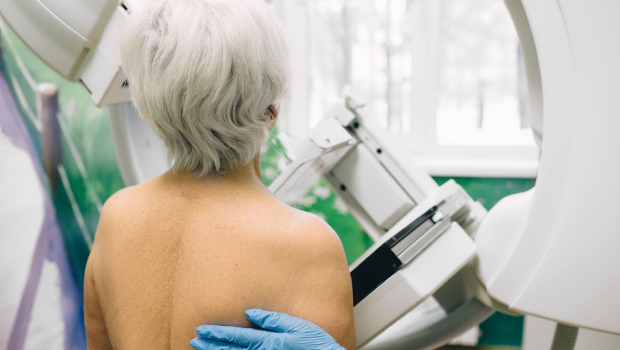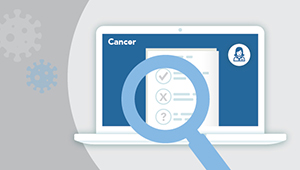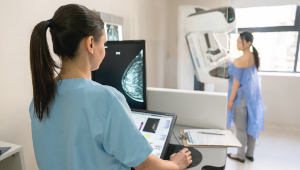Catching more breast cancers when mammograms are limited

New study calculates risk-based approach to detect the most cancers with the fewest exams
While the COVID-19 crisis is challenging, the pandemic is also giving researchers an opportunity to discover new approaches to saving lives. A study published March 25, 2021, in the Journal of American Medical Association Network Open recommends a new way for triaging mammogram patients during times of limited capacity, such as pandemic surges, when individuals may also experience anxiety about COVID-19.
The unique study was led by Diana L. Miglioretti, professor and division chief of biostatistics at the UC Davis Department of Public Health Sciences and affiliate investigator with Kaiser Permanente Washington Health Research Institute (KPWHRI).
In one of the largest studies of its kind, the researchers looked at nearly 900,000 individuals and close to 2 million mammograms from 2014 to 2019 at more than 90 radiology facilities in the national Breast Cancer Surveillance Consortium. They found that a risk-based algorithm — based on clinical indication, breast symptoms, breast cancer history, and age — successfully maximized cancer detection.
Key findings help spot high-risk individuals
Results showed that 12% of mammograms with “very high” and “high” cancer detection rates accounted for 55% of detected cancers, while 44% of mammograms with “very low” cancer detection rates accounted for 13% of detected cancers.
“What this means is that triaging individuals most likely to have cancer during periods of reduced capacity may be effective at detecting the most cancers with the fewest mammograms versus using a non-risk-based approach,” said Miglioretti.
Triage tactics could help in other times of crisis
COVID-19 has profoundly impacted the U.S. health care system, including breast cancer screening, surveillance, and diagnostic services. To rapidly respond to local stay-at-home orders during the initial phase of the pandemic, radiology facilities cancelled or reduced nonurgent services, including breast cancer screenings. The precipitous drop in screening and diagnostic imaging likely reduced the number of breast cancers diagnosed.
“Whether it is due to unexpected new surges in COVID-19 cases prompting new lockdowns or other emergencies such as cyberattacks or natural disasters like wildfires, the study results provide important guidance for navigating through any crisis that could impact the availability of mammograms,” said Miglioretti.
With the current status of the COVID-19 pandemic as of late March 2021, people should stay vigilant about their health and avoid skipping screenings.
“It is very important that individuals consult their clinician if they have any concerning breast symptoms such as a new or changing lump and schedule their screening mammogram if they are overdue,” said senior author Christoph Lee, professor of radiology at the University of Washington School of Medicine and an affiliate investigator with KPWHRI. “Clinicians and other health care staff are now vaccinated, and medical offices are taking all precautions to keep patients safe from COVID.”
Due to potential temporary inflammation of lymph nodes, mammography screenings should be done at least 30 days after a COVID-19 vaccination. However, women with new breast symptoms should contact their physicians and receive diagnostic mammography if warranted.
This study was supported by a Patient-Centered Outcomes Research Institute Program Award (PCS-1504-30370). Data collection for this research was additionally supported by the Breast Cancer surveillance Consortium with funding from the National Cancer Institute (PO1CA154292, U54CA163303), the Agea National Psoriasis Foundation Discovery Grant, an NIH/NIAMS R01 grant (1R01AR063091-01A1), and an NCI/NIH grant (U01-CA179582-03A1).
Co-authors on the study included KPWHRI Senior Investigator Diana Buist, PhD, MPH, Associate Investigator Karen Wernli, PhD, and Senior Research Associate Ellen O’Meara, PhD. A complete list of co-authors is available online.
This news release was written for University of California-Davis Comprehensive Cancer Center by Stephanie Winn, a senior public information officer at the center.
About the UC Davis Comprehensive Cancer Center
UC Davis Comprehensive Cancer Center is the only National Cancer Institute-designated center serving the Central Valley and inland Northern California, a region of more than 6 million people. Its specialists provide compassionate, comprehensive care for more than 15,000 adults and children every year and access to more than 150 active clinical trials at any given time. Its innovative research program engages more than 225 scientists at UC Davis who work collaboratively to advance discovery of new tools to diagnose and treat cancer. Patients have access to leading-edge care, including immunotherapy and other targeted treatments. Its Office of Community Outreach and Engagement addresses disparities in cancer outcomes across diverse populations, and the cancer center provides comprehensive education and workforce development programs for the next generation of clinicians and scientists.
About Kaiser Permanente Washington Health Research Institute
Kaiser Permanente Washington Health Research Institute (KPWHRI) improves the health and health care of Kaiser Permanente members and the public. The institute has conducted nonproprietary public-interest research on preventing, diagnosing, and treating major health problems since 1983. Government and private research grants provide our main funding. Follow KPWHRI research on Twitter, Facebook, and LinkedIn, or subscribe to our free monthly newsletter.
About Kaiser Permanente
Kaiser Permanente is committed to helping shape the future of health care. We are recognized as one of America’s leading health care providers and not-for-profit health plans. Founded in 1945, Kaiser Permanente has a mission to provide high-quality, affordable health care services and to improve the health of our members and the communities we serve. We currently serve more than 12.4 million members in eight states and the District of Columbia. Care for members and patients is focused on their total health and guided by their personal Permanente Medical Group physicians, specialists and team of caregivers. Our expert and caring medical teams are empowered and supported by industry-leading technology advances and tools for health promotion, disease prevention, state-of-the-art care delivery and world-class chronic disease management. Kaiser Permanente is dedicated to care innovations, clinical research, health education and the support of community health. For more information, go to: kp.org/share.
co-researcher
,
Healthy Findings Blog

Cancer screening in the time of COVID-19
Dr. Diana Buist reflects on the challenges of providing screening during a pandemic — and finds reason for optimism.
News

Race, income, education affect access to 3D mammography
The technology’s potential benefits to detect breast cancer earlier are not equally shared among all women, researchers find.



